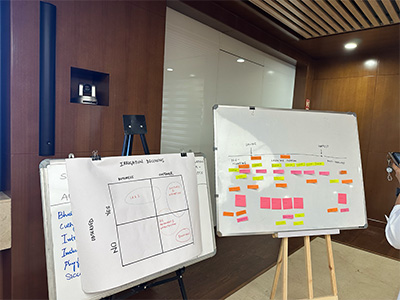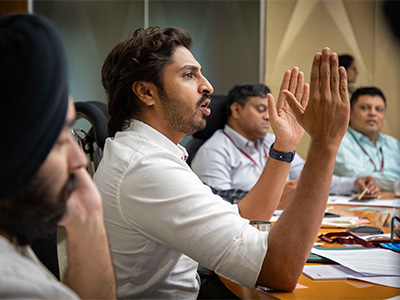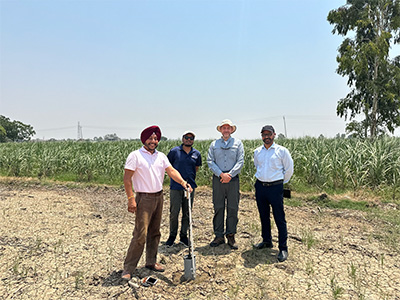When it comes to innovations in agricultural water management, India cannot be overlooked. As the world’s largest user of groundwater irrigation and home to the largest population of smallholder farmers, the country serves as a prime testing ground for these innovations. In response to the impacts of climate change and growing concerns about water scarcity in the country, Indian entrepreneurs are also highly enthusiastic about addressing problems with important environmental and social impacts.
As the agricultural entrepreneurial ecosystem develops, The/Nudge Institute and DCM Shriram’s AgWater Challenge acts as a catalyst for startups working to solve challenges around water conservation in agriculture. This unique 18-month prize program focuses on startups working with specific crops such as rice, cotton, and sugarcane, and solving smallholder farmers’ problems through the lens of water stewardship and sustainability. The AgWater Challenge selected a cohort of 16 startups from a pool of 134 global applications. The program supports the selected startups by providing access to a network of mentors, knowledge resources, funding, and connections. One standout startup will win a prize of $250,000 to build and implement its solution.
The Daugherty Water for Food Global Institute (DWFI) is a knowledge partner for the AgWater Challenge. Recently, DWFI co-hosted a workshop on Impact Narratives and Growth Strategies in agtech in Bangalore, India. Nick Brozović and I led the session for 10 water-focused agtech companies from the cohort. The workshop centered on providing a pathway to building impact narratives for agtech and climate tech startups focused on water conservation, using business models and data strategies. The companies engaged in business model categorizations, mapping interactions with users and farmers over the cropping season, identifying decision-makers based on data, interpreting data, and addressing context-specific missing data. Participants were then tasked with building an engaging narrative to tell the story of their environmental impact based on these components. The energy and the insights generated during the session were inspiring.

As a part of the workshop, we had an engaging roundtable discussion with multiple ecosystem partners and stakeholders about some common choke points in agtech, including customer acquisition costs and distribution channels. Ecosystem partners and stakeholders involved in the roundtable included institutional investors and venture capitalists, as well as those representing accelerators, non-profits, and research institutions focused on water use in agriculture. One of the key outcomes of the discussion was the ecosystem partners' willingness to collaborate on extending the distribution network for startups with the support of public and government initiatives. Such collaborative efforts may address key barriers and enhance the reach and impact of these innovations. Moving forward, DWFI plans to support the startups by offering networking opportunities and facilitating conversations with university researchers and the entrepreneurial ecosystem. Through these efforts, we hope to further strengthen the growing agtech ecosystem.

Post-workshop, we had the opportunity for field visits with three startups—Oscillo Machines, Cultyvate, and BharatRohan—each of which offers different solutions to improve agricultural water management. Oscillo Machines provides self-propelled paddy transplanters designed for local needs and Direct Seeded Rice (DSR) machines tailored for smallholders and women farmers. BharatRohan utilizes hyperspectral imaging and thermal imagery via drone deployment to provide insights into water management. Cultyvate offers IoT and sensor-enabled precision farm analytics and alternate wetting and drying (AWD) solutions for rice cropping systems, among other services.

Despite the sophistication of these technologies, the startups strategically focus on making operations simple and seamless for farmers in the field. For example, BharatRohan generates insights about irrigation management by collecting data using drones, while Cultyvate uses IoT/sensors. While the underlying technology is complex, both startups simplify the use of technology by offering follow-up support to ensure the farmers follow the agronomic advice through phone notifications or follow-ups by local micro-entrepreneurs or staff. This approach ensures that farmers' decision-making behaviors are observed and that the implemented technology and practice changes benefit participating farmers.
The field visits provided a valuable firsthand experience of how Indian agricultural and climate tech startups are leveraging technology to address critical smallholder challenges in agricultural water management. We observed this being accomplished through mechanization, IoT/sensors, remote sensing, data analytics, and biological offerings to reduce water application.
DWFI is grateful to the DCM Shriram Foundation and the/Nudge Institute AgWater Challenge team for hosting the workshop, roundtable discussions, and field trips and looks forward to continuing the partnership.


